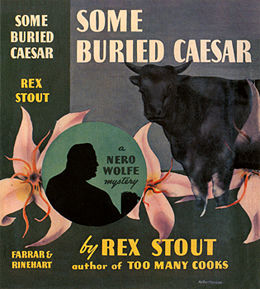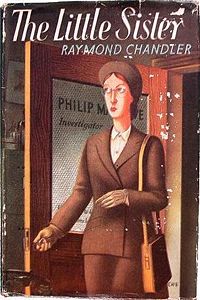“We respond to a drama to that extent to which it corresponds to our dreamlife.”
David Mamet, Writing in Restaurants
Archives for 2008
TT: So what else is new?
 Busy as always, I’m off to Washington this morning to attend a meeting of the National Council on the Arts. On Friday afternoon I’ll be lunching at the U.S. Supreme Court, where the National Endowment for the Arts and Justices Scalia, Kennedy, and Ginsburg are throwing a lunchtime bash for Leontyne Price, Carlisle Floyd, Richard Gaddes, and James Levine, the first recipients of the new NEA Opera Honors.
Busy as always, I’m off to Washington this morning to attend a meeting of the National Council on the Arts. On Friday afternoon I’ll be lunching at the U.S. Supreme Court, where the National Endowment for the Arts and Justices Scalia, Kennedy, and Ginsburg are throwing a lunchtime bash for Leontyne Price, Carlisle Floyd, Richard Gaddes, and James Levine, the first recipients of the new NEA Opera Honors.
Well-informed readers will recall that Gaddes retired the other day from the Santa Fe Opera, where one of his last duties was to commission Paul Moravec and me to write The Letter. I had nothing whatsoever to do with Gaddes’ receiving an NEA Opera Honor–the NEA is exceedingly fussy about conflicts of interest, real or perceived–but it goes without saying that I’m glad he’s getting it, and I’ll be saying a few words to that effect on Friday.
You know the rest. I’ll blog when I can. See you around.
CAAF: Morning coffee
• There was no more sleep for me that night, and I was thankful when daylight came. Another story to print and read in a sunlit place, Edith Wharton’s “The Lady’s Maid’s Bell.”
(Previous Halloween installments: Elizabeth Bowen’s “The Demon Lover” and Kelly Link’s “The Specialist’s Hat.”)
• This catalog of haunted libraries in the Northeast makes a good companion to the Wharton. The case of the ghost who habituates the U.S. Capital Building Rotunda (former near neighbor to the Library of Congress) is particularly poignant. He’s said to be the ghost of a librarian who is looking for “$6,000 he stashed in the pages of some obscure volumes.” The library of course has long since been moved, the money found and (one assumes) dispersed … and still the poor guy wanders. One wonders, Can no one tell him? Can’t a collection be taken up? And what exactly were the titles of those obscure volumes? I picture the librarian alive and stalking through the stacks all, “Population Fluctuations on the Lapsang Peninsula (1812-1843)? Ain’t no one looking in there.” (Via Maud.)
TT: Snapshot
Frank Lloyd Wright appears as the mystery guest on What’s My Line?:
(This is the latest in a weekly series of arts-related videos that appear in this space each Wednesday.)
TT: Almanac
“Stupidity, outrage, vanity, cruelty, iniquity, bad faith, falsehood–we fail to see the whole array when it is facing in the same direction as we.”
Jean Rostand, The Substance of Man
TT: Almanac
“I wanted to slap her, because her tone, and the look in her eyes going over me, made me feel like a potato she was peeling.”
Rex Stout, Some Buried Caesar
CD
Dennis Brain: The Horn Player (EMI, four CDs). This specially priced box set contains most of the commercial recordings of the great British horn player whose death in a 1957 car accident deprived the world of one of its most prodigally gifted instrumentalists. Brain’s celebrated studio performances of the concertos of Mozart, Richard Strauss, and Paul Hindemith are all here, together with a generous helping of chamber music, including the exquisitely played versions of Dukas Villanelle and the Schumann Adagio and Allegro that he recorded with Gerald Moore in 1952. If you’ve never heard Brain’s horn playing, prepare yourself to experience a miracle of suavity and grace (TT).
TT: Who’s on first?
 Mrs. T and I just returned from a much-needed holiday at Ecce Bed and Breakfast, our favorite retreat. One of the books that I brought along with me to read was Some Buried Caesar, the sixth of Rex Stout’s Nero Wolfe novels, published in 1939. In it Archie Goodwin makes the following remark about Lily Rowan, his on-again-off-again girlfriend: “I was wondering which would be more satisfactory, to slap her and then kiss her, or to kiss her and then slap her.”
Mrs. T and I just returned from a much-needed holiday at Ecce Bed and Breakfast, our favorite retreat. One of the books that I brought along with me to read was Some Buried Caesar, the sixth of Rex Stout’s Nero Wolfe novels, published in 1939. In it Archie Goodwin makes the following remark about Lily Rowan, his on-again-off-again girlfriend: “I was wondering which would be more satisfactory, to slap her and then kiss her, or to kiss her and then slap her.”
 I must have read the book a dozen times over the years, but never until now had that line caught my eye. Suddenly a coin dropped in my head and I remembered another line: “She reached a quick arm around my neck and started to pull. So I kissed her. It was either that or slug her.” It comes, of course, from Raymond Chandler’s The Little Sister, published in 1949.
I must have read the book a dozen times over the years, but never until now had that line caught my eye. Suddenly a coin dropped in my head and I remembered another line: “She reached a quick arm around my neck and started to pull. So I kissed her. It was either that or slug her.” It comes, of course, from Raymond Chandler’s The Little Sister, published in 1949.
Chandler once told a correspondent that he considered himself “far above” Stout, and very likely he did. But could it possibly be that he was thinking of Some Buried Caesar, consciously or not, when he penned that famous line?
